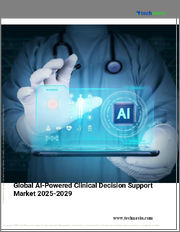
|
시장보고서
상품코드
1513545
AI를 활용한 혁신적인 임상시험 기업 : 전략적 프로파일링과 성장 기회Innovative AI-enabled Clinical Trial Companies: Strategic Profiling and Growth Opportunities |
||||||
임상시험 관리에 현실 세계 인사이트를 통합하여 임상시험에서 AI 채택을 촉진
전 세계 임상 파이프라인에서 복잡한 신규 치료제가 급증하는 가운데, 계획 및 실행을 위한 기술 기반 솔루션을 활용한 적응형 시험 설계를 통해 시험 설계를 개선하는 것이 일반화되고 있습니다. 인공지능(AI)은 분산형 임상시험 설계를 지원하고 환자 중심의 임상시험 방식을 가능하게 한다는 점에서 큰 주목을 받고 있습니다. 임상시험은 전자의무기록(EMR) 형태의 대규모 장기 환자 데이터베이스에 의존하고 있습니다. 강력한 데이터베이스를 사용할 수 있음에도 불구하고, 대부분의 데이터베이스는 명확성과 구조가 명확하지 않아 읽기 어려운 경우가 많습니다. 그 결과, AI/머신러닝(ML) 알고리즘과 플랫폼의 급속한 보급으로 비정형 데이터베이스를 쉽게 구조화할 수 있게 되었고, 전자의무기록(EHR)은 전 세계 임상시험 환경을 개선할 수 있는 방대하고 풍부하며 관련성 높은 데이터 소스가 되었습니다.
임상시험 설계, 시설 선정, 환자 발굴 및 유지에 통합된 AI 기반 솔루션을 도입함으로써 CRO와 제약사 시장 진출 전략이 용이해지며, AI는 임상시험에서 비용 절감, 효율성, 원격 환자 모집, 관리 및 참여를 통한 분산형 임상시험으로의 전환을 지원하는 데 점점 더 중요한 역할을 하고 있습니다. 분산형 임상시험으로의 전환을 지원하는 것이 중요해지고 있습니다. 음성 인식, 챗봇 및 기타 장치 형태의 대화형 플랫폼은 환자의 순응도를 높이고 더 많은 환자를 확보할 수 있도록 돕습니다. RCT는 AI의 적용이 확대되고 있는 또 다른 중요한 분야로, 의뢰자는 이 기술을 활용하여 생성된 방대한 시설 수준의 데이터 세트를 분석하여 시험 설계 및 수행에 대한 가시성을 높일 수 있습니다. 가시성을 높일 수 있습니다.
Icon plc, Novotech, Syneos Health, IQVIA와 같은 대형 CRO와 BMS, Amgen, AstraZeneca와 같은 일부 제약사들은 AI 기반 플랫폼을 도입하여 시설 선정 및 환자 모집을 지원하고 있으며, Novartis 등 다른 많은 기업들도 임상시험에 AI를 적용하여 전체 임상시험의 타임라인을 단축하기 위해 다양한 단계의 최적화를 가능하게 하고 있습니다.
AI는 RWD 수집 및 분석, 임상 1상과 임상 2상의 원활한 결합, 새로운 환자 중심 평가변수 개발 등 임상시험을 혁신하는 근본적인 혁신을 가져오고, AI는 다양한 입력으로부터 표준화되고 구조화된 디지털 데이터 요소를 생성하는 데에도 활용될 수 있습니다. AI를 활용한 임상시험 설계는 환자 중심의 설계를 최적화하고 가속화하여 환자의 부담을 크게 줄이고, 성공 가능성을 높이며, 수정 횟수를 줄이고, 임상시험의 전반적인 효율성을 향상시킬 수 있습니다. 대형 기술 제공업체와 제약 스타트업의 협력은 향후 보다 효과적인 임상시험을 위한 기반을 마련하고 있습니다.
목차
전략적 필수 요건
- 왜 성장이 어려워지고 있는가?
- The Strategic Imperative 8(TM)
- AI를 활용한 임상시험 업계에 대한 주요 전략적 필수 요건의 영향
- Growth Pipeline Engine(TM)을 가속하는 성장 기회
에코시스템
- 분석 범위
- 세분화
- 의약품 개발 벤더 에코시스템
- AI 벤더 에코시스템
- 임상시험 AI 활용 가치 제안
- 독자적인 가치 제안에 근거한 전략적 개요
성장 기회 분석
- 성장 촉진요인
- 성장 억제요인
- 규제 시나리오 : 임상시험에서의 AI 사용
- ConcertAI : 기업 개요
- ConcertAI : 가치 제안
- ConcertAI : 성장 전략
- Unlearn : 기업 개요
- Unlearn : 가치 제안
- Unlearn : 성장 전략
- Phesi : 기업 개요
- Phesi : 가치 제안
- Phesi : 성장 전략
- QuantHealth : 기업 개요
- QuantHealth : 가치 제안
- QuantHealth : 성장 전략
- Owkin : 기업 개요
- Owkin : 가치 제안
- Owkin : 성장 전략
- Deep 6 AI : 기업 개요
- Deep 6 AI : 가치 제안
- Deep 6 AI : 성장 전략
- Paradigm : 기업 개요
- Paradigm : 가치 제안
- Paradigm : 성장 전략
- Mendel Health : 기업 개요
- Mendel Health : 가치 제안
- Mendel Health : 성장 전략
- Oncoshot : 기업 개요
- Oncoshot : 가치 제안
- Oncoshot : 성장 전략
- Amazon Web Services, Inc.
- AWS : 가치 제안
- AWS : 성장 전략
성장 기회
- 성장 기회 1: 연합 데이터 시스템과의 데이터 상호운용성
- 성장 기회 2: 환자 식별 및 등록을 위한 LLM을 통한 데이터 재구조화 및 배포
- 성장 기회 3: RWD/RWE 기반 종양학 임상시험 설계 및 프로토콜 최적화
- 자료 리스트
- 면책사항
The Integration of Real-world Insights into Trial Management is Propelling AI Adoption in Clinical Trials
As global clinical pipelines witness a surge in complex novel therapies, there is a general inclination toward improving trial design through adaptive trial designs with technology-enabled solutions for planning and execution. Artificial intelligence (AI) is gaining large-scale recognition in terms of supporting decentralized trial designs and allowing patient-centric clinical trial modalities. Clinical trials rely on large-scale longitudinal patient databases in the form of electronic medical records (EMRs). Despite the availability of robust databases, most lack clarity and structure, making them difficult to read. As a result, the rapid adoption of AI/machine learning (ML) algorithms and platforms allows easy structuring of unstructured databases, and the use of electronic health records (EHRs) represents a vast, rich, and highly relevant data source that holds tremendous potential to improve the global clinical trial landscape.
Incorporating integrated AI-driven solutions in clinical trial design, site selection, and patient identification and retention will ease the go-to-market strategy for various CROs and pharmaceutical companies. AI is gaining significance in clinical trials to reduce cost, increase efficiency, and support the transition to decentralized trials through remote patient recruitment, management, and engagement. Interactive platforms in the form of voice recognition, chatbots, and other devices ensure better patient adherence and greater retention. These platforms are also highly beneficial in the selection of appropriate investigators and trial sites. Randomized control trials (RCTs) represent another important area seeing increased AI application, where sponsors can leverage the technology to analyze the vast site-level datasets generated for greater visibility into trial design and implementation.
Leading CROs, such as Icon plc, Novotech, Syneos Health, and IQVIA, as well as several pharmaceutical companies, including BMS, have successfully deployed AI-based platforms to support site selection and patient recruitment. BMS, Amgen, AstraZeneca, and Novartis, among several other companies, are also applying AI in clinical trials to enable the optimization of different stages, with the intent of reducing overall trial timelines.
AI brings innovation fundamental to transform clinical trials, such as collecting and analyzing RWD, seamlessly combining phase I and II of clinical trials, and developing novel patient-centric endpoints. AI can also be leveraged to create standardized, structured, and digital data elements from a range of inputs. As AI-enabled study design helps optimize and accelerate the creation of patient-centric designs, it significantly reduces patient burden, increases the likelihood of success, decreases the number of amendments, and improves the overall efficiency of trials. Together, large technology providers and pharmaceutical start-ups are setting the stage for more effective clinical trials in the future.
Table of Contents
Strategic Imperatives
- Why Is It Increasingly Difficult to Grow?
- The Strategic Imperative 8™
- The Impact of the Top 3 Strategic Imperatives on the AI-enabled Clinical Trials Industry
- Growth Opportunities Fuel the Growth Pipeline Engine™
Ecosystem
- Scope of Analysis
- Segmentation
- Drug Development Vendor Ecosystem
- AI Vendor Ecosystem
- Value Proposition of Using AI in Clinical Trials
- Strategic Profiles Based on Unique Value Proposition
Growth Opportunity Analysis
- Growth Drivers
- Growth Restraints
- Regulatory Scenario: AI Use in Clinical Trials
- ConcertAI: Company Overview
- ConcertAI: Value Proposition
- ConcertAI: Growth Strategy
- Unlearn: Company Overview
- Unlearn: Value Proposition
- Unlearn: Growth Strategy
- Phesi: Company Overview
- Phesi: Value Proposition
- Phesi: Growth Strategy
- QuantHealth: Company Overview
- QuantHealth: Value Proposition
- QuantHealth: Growth Strategy
- Owkin: Company Overview
- Owkin: Value Proposition
- Owkin: Growth Strategy
- Deep 6 AI: Company Overview
- Deep 6 AI: Value Proposition
- Deep 6 AI: Growth Strategy
- Paradigm: Company Overview
- Paradigm: Value Proposition
- Paradigm: Growth Strategy
- Mendel Health: Company Overview
- Mendel Health: Value Proposition
- Mendel Health: Growth Strategy
- Oncoshot: Company Overview
- Oncoshot: Value Proposition
- Oncoshot: Growth Strategy
- Amazon Web Services, Inc.
- AWS: Value Proposition
- AWS: Growth Strategy
Growth Opportunity Universe
- Growth Opportunity 1: Data Interoperability with Federated Data Systems
- Growth Opportunity 2: Data Restructuring and Distribution with LLMs for Patient Identification and Enrollment
- Growth Opportunity 3: RWD/RWE-based Oncology Trial Design and Protocol Optimization
- List of Exhibits
- Legal Disclaimer



















